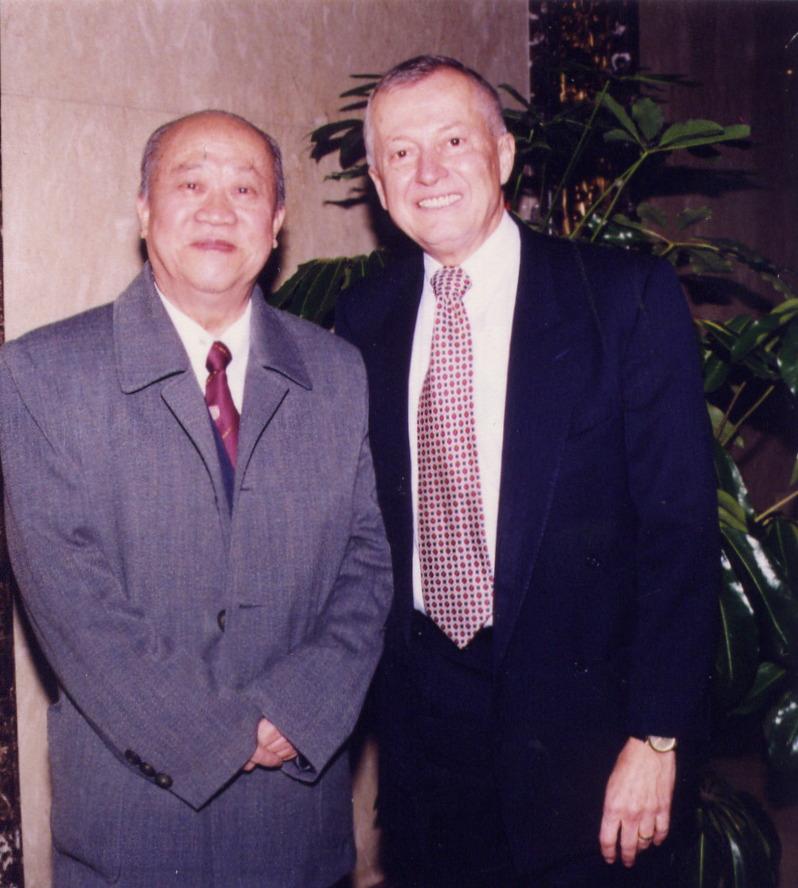


Academician Professor Chen Shupeng and Professor van Genderen, on the Great Wall, April, 1977. [Photo provided to CAS]

Academician Professor Chen Shupeng and Professor van Genderen, thirty years later! (2007) [Photo provided to CAS]
The year 2017 marks the fortieth anniversary of scientific co-operation between the Chinese Academy of Sciences (CAS) and Europe.
In 1977, a delegation from CAS went to the U.K., a visit hosted by the Royal Society, and visited various research centers. This visit was more than a year before China formally started its reform and opening-up policy.
One of the CAS delegation members was the Academician Chen Shupeng from the CAS Institute of Geography (IOG). He was hosted by Prof. John van Genderen, co-founder and General Secretary of the British Remote Sensing Society which had been formally established in January, 1974. Prof. van Genderen arranged for Prof. Chen to be introduced to remote sensing in the U.K., and showed him various remote sensing institutes, companies and an airborne remote sensing platform equipped with multiple sensors.
As a result of this visit, Prof. van Genderen was invited to visit CAS in Beijing, China during April and May, 1978, to give lectures on remote sensing and advice on the design and setting up of a new CAS institute: the Institute of Remote Sensing Applications (IRSA). This involved designing the building and laboratories, consulting on the equipment requirements, training/personnel needs, etc. After just a short period, IRSA was formally established in 1979, with Prof. Chen as its honorary Director-General. At that time, there were almost no cars in Beijing, neither were there high-rise buildings nor many computer facilities in the field of remote sensing. Now, after 40 years, China has become a world leader in remote sensing; the Institute of Remote Sensing and Digital Earth (RADI) has been instrumental in making these great achievements.
Since that first visit to China in the spring of 1978, Prof. van Genderen has visited China more than two hundred times, and been closely involved with the developments of remote sensing in China. When Prof. Chen’s four-year term was completed, Prof. Yang Shiren took over, followed in turn by CAS Academicians Tong Qingxi, Xu Guanhua, Guo Huadong, and Li Xiaowen. Prof. Guo later established the CAS Center for Earth Observation and Digital Earth (CEODE), which later merged with the former IRSA to form RADI.
Prof. van Genderen has worked closely with CEODE and is working currently with RADI, both as a visiting senior researcher, and on many joint scientific projects. RADI has many international programs and cooperates with almost all top organizations in this field. Prof.van Genderen said that it has been a great honour to have been able to be involved in China's rapid development in the field of Earth observation, and to see it grow from such humble beginnings to its current leading role in the world.
Prof. van Genderen has trained hundreds of Chinese scholars at M.Sc., Ph.D., and Post-Doc. levels in Europe, as well as hosted several visiting scholars and arranged European study tours. From 2009 to 2011 he was a CAS visiting senior researcher at CEODE in Beijing. During his forty years of working in China, he has visited CAS institutes throughout China, from Xinjiang in the North-West to Xi’an, Shanghai, Nanjing, Sanya, and many other places.
He was the Project Leader of the first Asian Development Bank Technical Assistance project in China on “Monitoring Fragile Ecosystems in Shanxi, Shaanxi and Inner Mongolia”, for which IRSA was the local counterpart, in the early 1990’s.
Currently Prof. van Genderen is a Science Committee Member of the Digital Belt and Road Initiative (DBAR).
He helped to found the International Journal of Digital Earth (IJDE) and was co-founder of the International Society of Digital Earth (ISDE), both hosted by RADI.
He is Vice-President of the European Chapter of the International Eurasian Academy of Sciences, former President of the Technical Commission on Remote Sensing of the International Society for Photogrammetry and Remote Sensing (ISPRS), and has received numerous awards from the Crown Princess of Thailand, from the Government of Mongolia, and various other countries for his services to Asian remote Sensing.
Prof. van Genderen is currently an Emeritus Prof. at the University of Twente in Enschede, the Netherlands.
For more information, please contact:John van Genderen, at: genderen@alumni.itc.nl, or
Institute of Remote Sensing and Digital Earth, Chinese Academy of Sciences